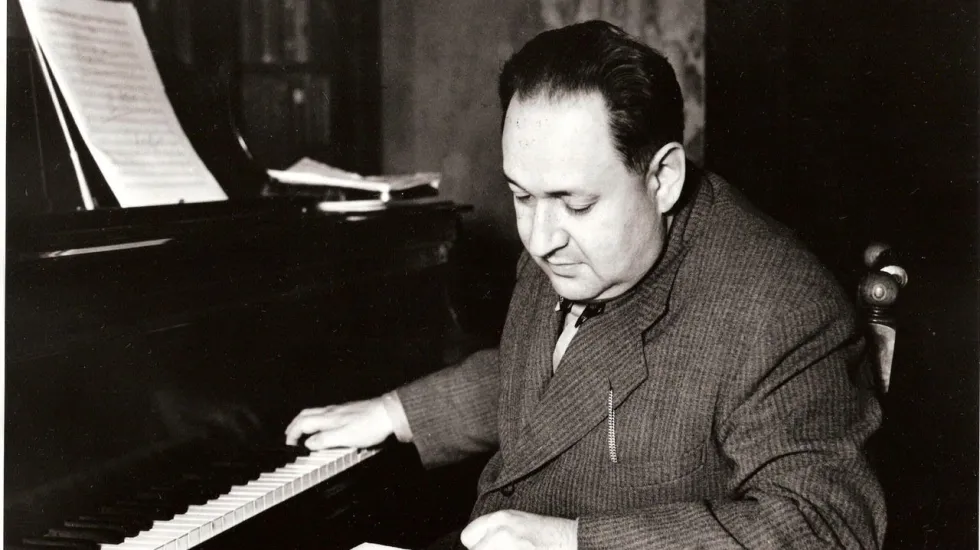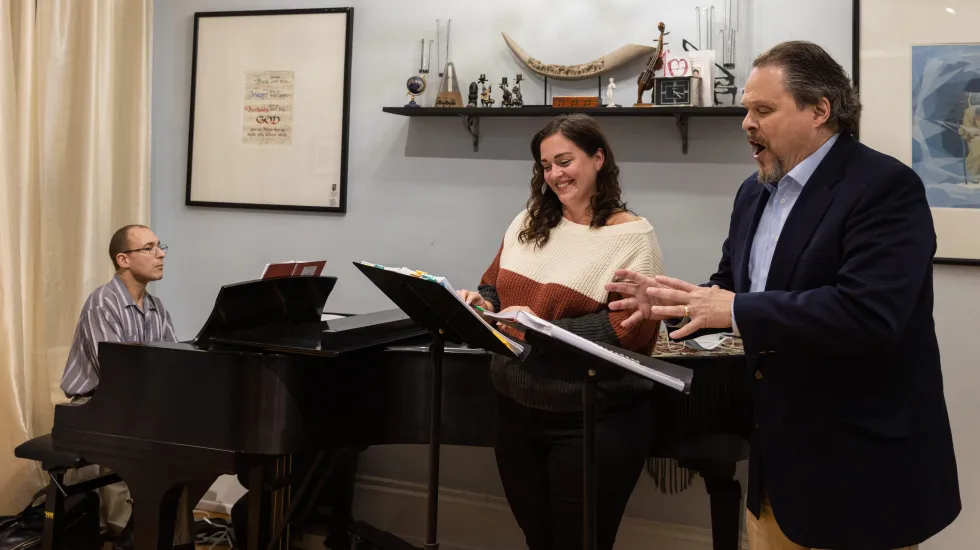
The Nazis ended or upended the lives of more than two dozen notable European composers in the 1930s or ’40s, altering the course of modern music history and causing many of them to be forgotten or overlooked.
Erich Wolfgang Korngold, one of the best-known of these musical creators—most of them Jewish—will be spotlighted April 1-10 during a festival organized by the University of Chicago and Folks Operetta, which has rediscovered and produced rare Austrian and German operettas since 2006.
Philip Bohlman, the Ludwig Rosenberger Distinguished Service Professor in the university’s department of music, believes Korngold (1897-1957) is an ideal candidate for such a treatment because his work in Hollywood has given him broader audience appeal than many of his peers.
University of Chicago and Folks Operetta:
‘Korngold Rediscovered’
When: Festival, April 1-10; “Die Kathrin,” 7:30 p.m. April 7 and 9
Where: Logan Center, University of Chicago, 915 E. 60th
Tickets: “Die Kathrin,” $50-$75
Info: korngoldfestival.org
The Austrian-born composer wrote the scores for 16 films, including the pirate swashbuckler, “Captain Blood” (1935), and one of Ronald Reagan’s best-known productions, “King’s Row” (1942). He won Academy Awards for “Anthony Adverse” (1936) and “The Adventures of Robin Hood” (1938).
“He does all this work for film, which is tremendously influential,” Bohlman said. “You listen to a Korngold score and John Williams comes immediately to mind. He’s the one who influenced the Hollywood sound for the next half-century almost.”
Korngold was a highly successful concert and opera composer in Europe in the 1920s and ’30s, beginning with a popular ballet he wrote at age 11. He first came to Hollywood in 1934 and was forced to remain in the United States in 1938 when the Nazis took over Austria and his family barely escaped.
After World War II, he wrote some additional concert works, but he never attained his former standing in the field. Today, only his Violin Concerto (1945) is part of the standard classical repertoire, and his opera, “Die tote Stadt (The Dead City)” from 1920 is regularly performed in Europe.
Planning for the Korngold festival began in 2018 when the Folks Operetta extended its scope to opera as part of its Reclaimed Voices series. The project focuses on composers and librettists who were killed or exiled during or before World War II.

“It wasn’t about talking people’s victimhood,” said artistic director and co-founder Gerald Frantzen. “What we wanted to do is celebrate their lives at their fullest, as creative geniuses.”
During research for the series, he became interested in Korngold, who re-orchestrated several operetta scores by Johann Strauss Jr. Frantzen learned about the composer’s final opera, “Die Kathrin,” which was begun in 1933 and finished several years later.
He made some connections with the Korngold family and became intrigued with presenting the mostly forgotten work in Chicago. He contacted the University of Chicago in March 2019 about developing a festival devoted to the under-recognized composer, and school officials across several programs enthusiastically embraced the idea.
The festival will include an April 2 concert devoted to Korngold’s art songs and operettas, an April 8 screening of “Robin Hood,” an April 10 presentation of the composer’s String Quartet No. 3, and a two-day symposium featuring a range of experts.
But the event’s centerpiece will be the Folks Operetta’s semi-staged American debut of “Die Kathrin,” with April 7 and 9 performances at the Logan Center’s 474-seat performance hall, featuring a 64-piece orchestra and 30-voice chorus.
The opera debuted in Sweden in 1939, receiving negative, anti-Semitic reviews. It failed to find favor subsequently in part because its overt Romanticism ran counter to more avant-garde styles that arose with such composers as Arnold Schoenberg and Anton Berg.
Frantzen believes the love story has been unfairly neglected. “We’ve seen all the great pieces at the opera house in Chicago,” he said. “We love our ‘Toscas.’ This is a little bit different and something new, something worthy. It’s tonal and still accessible, and it’s certainly something that the public hasn’t seen.”
Chicago conductor Anthony Barrese, the Folks Operetta’s music director since 2012, said that parts of Korngold’s opera echo Richard Strauss. Other sections “absolutely” sound like Giacomo Puccini, particularly the famed Italian composer’s 1917 opera, “La Rodine,” but with a bigger, more Germanic sound.
“People point out that this has saxophones, a banjo and all these things,” Barrese said, “but it doesn’t have a real jazz flavor to it. It still sounds very much like a late Romantic German opera with definite tinges of operetta and it is very informed by the swashbuckling sound that he would go on to win Academy Awards for.”
The conductor believes that “Die Kathrin” has the potential for a broader revival.
“I think people will be blown away by the music, and, hopefully, it will inspire [other opera] companies to look and say, ‘This needs to be done with all the bells and whistles and a fully staged production.’”







